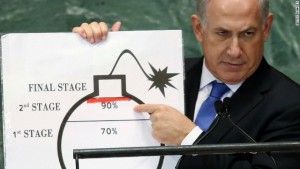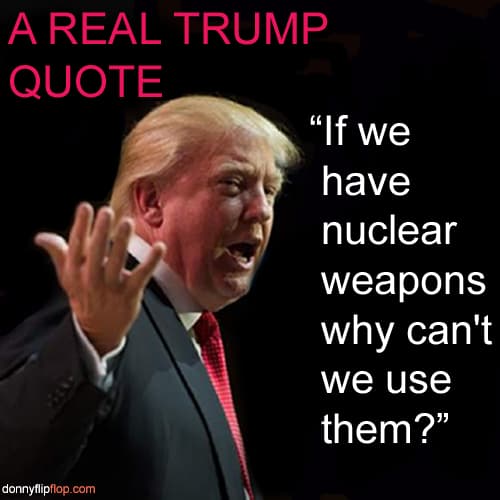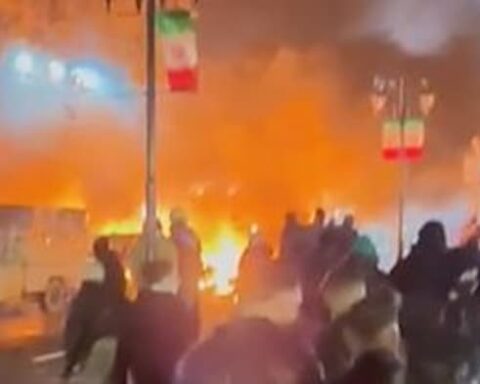I published a couple of pieces here last year, talking about how worrying and dangerous it was that the language – and indeed the policies – surrounding nuclear weapons appeared to be changing: and how this had ominous implications.
Why that subject particularly came into focus was because of the revised ‘US Nuclear Posture Review‘, which laid out a significant shift in both tone and policy (and which one observer had described as ‘the world’s most dangerous document’).
This seems to have been a very, very serious document with big implications – but it also appeared to have been broadly ignored by the media: despite concerns that the 2018 Nuclear Posture Review (NPR) may have essentially been clearing the way for future nuclear-weapons-based mass murder on a par with Hiroshima and Nagasaki.
The biggest shift in language or policy was the implication of the ‘first use’ or preemptive option being applied even in a scenario that doesn’t involve the mutual threat of nuclear weapons. So, for example, in January last year (a couple of weeks before the NPR was rolled out), the Pentagon had even proposed using nuclear weapons in response to a cyber attack (seriously).
It seemed to represent a total shift away from the cautious approach or langauge to nuclear weapons that had prevailed for decades. In response, Russia began overtly saber-rattling too in regard to its nuclear weapons and capabilities – and it very much felt like we were back in the Cold War.
And that trend has carried on: along with the sense of cowboy, gung-ho attitudes… involving potential mass destruction on insane scales.
For example, Donald Trump has confirmed that the US is leaving the Cold War era Intermediate-range Nuclear Forces (INF) treaty.
Vladimir Putin, in response, has recently warned that Russia has missiles aimed at Western capitals.
The Trump administration seems to be pursuing a policy aimed at rebooting and expanding the nuclear arms race.
The real danger now is that the Pentagon’s NPR ‘lowering of the threshold for employing nuclear weapons’ means, in theory, that a nuclear attack (and nuclear war) could erupt over things that have never before been considered grounds for so extreme an action.
This changing state of affairs hasn’t unfolded organically: it is being deliberately created and amplified, for whatever reason.
Even political figures in the UK (including Michael Fallon and Theresa May) were shifting tone about nuclear strikes, including ‘first strike’ options. It had struck me, two years or so ago, when I heard British politicians talking about first-strike possiblities, that this was new language being casually used where it wouldn’t have been in the past.
Paul Rogers, of the Global Security Consultant to Oxford Research Group, warned last year that ‘Current revision of the United States’ declared nuclear posture is only the most visible manifestation of adjustments to all the main nuclear arsenals, with the UK at the vanguard of deploying technologies potentially calibrated for pre-emptive rather than retaliatory strike.’
That’s all worrying.
But then you have to factor in the Middle East powder-keg as well.
Now we’ve been hearing about the ‘White House plan’ to share nuclear technology with the Saudis.
We’re told, ‘Top White House officials pushed a plan to share nuclear technology with Saudi Arabia, despite objections from career national security staff, according to a new congressional report.’
Donald Trump’s former national security adviser Michael Flynn was apparently a key backer of the plan for a group of US companies to build dozens of nuclear power plants in Saudi Arabia.
The report tells us that, ‘The whistleblowers who came forward have expressed significant concerns about the potential procedural and legal violations connected with rushing through a plan to transfer nuclear technology to Saudi Arabia.’
The report also cites the key role of Trump’s son in law, Jared ‘666‘ Kushner. Maybe gifting nuclear technology to Saudi Arabia is part of the hyped Kushner ‘Middle East Peace Plan’ – said to be scheduled for an April 9th unveiling to the world. Given the fact that Saudi Arabia has been leading the devastation of Yemen for four years now (with mostly conventional weapons), quite how anyone would think it smart to impart potential nuclear capabilities to a state like that is baffling.

Defenders of the idea might try to argue that the Saudis are only interested in peaceful development of nuclear energy (the same argument Iran gave for its nuclear programmes). However, Pakistan – already a nuclear power – was, a few years ago, rumoured to have been already on the verge of selling nuclear weapons technology to Saudi Arabia. Though there seems to have been no confirmation that this happened, it demonstrates that the Saudis have been interested in acquiring nuclear technology.
Speaking of Pakistan, the recent flashpoint between Pakistan and India (over the Pulwama terror attack), was yet another warning siren that put many observers into panic mode for a few days: those are both nuclear powers.
Although it was unlikely to come to it, that scenario two weeks or so ago could’ve – in theory – resulted in nuclear weapons being used.
But with the possibility of Saudi Arabia developing nuclear technology in the future, the potential for the Middle East and its multiple armed conflicts to ‘go nuclear’ is increasing exponentially.
If the US does end up assisting the Saudis in that direction, then the entire business of preventing Iran from developing its nuclear programme will become all the more incongruous.
However, this analysis is avoiding the giant elephant in the room (or the giant elephant in the region, to be more precise): specifically the fact that Israel is already a nuclear power and has in fact been the only nuclear power in the Middle East for decades, with an ‘undeclared’ and unoffical nuclear arsenal of unknown size.
So while Benjamin Netanyahu can stand before the UN General Assembly, as he famously did, holding up his cartoon drawing of ‘an Iranian bomb’, he is simply making an absolute joke at everyone’s expense.

Israel of course has always denied its nuclear weapons programme, but it’s the worst kept secret in history; The Israeli nuclear weapons programme was driven primarily by former Prime Ministers David Ben Gurion and Shimon Peres, said to have been heavily aided (in secret) by the US, France and Apartheid South Africa.
Israel is also one of only a few nations refusing to sign the Nuclear Non-Proliferation Treaty: and for all the talk in the US of an Iranian nuclear programme being too dangerous (and Iran being regarded as an irresponsible player – which may be true), remember that Israel tried to sell nuclear weapons to Aparteid South Africa!
How much more irresponsible than that is a nuclear Iran likely to be?
Or try this.
Secretary-General of the UN Antonio Guterres recently presented a report to the UN Human Rights Council, revealing that Israel has been burying “nuclear waste with radioactive content in 20 different areas populated by Syrian citizens” in the occupied territory of the Golan Heights. Most of the waste has allegedly been dumped in the area near Al-Sheikh Mountain.
According to the UN report, this puts “the lives and health of Syrians in the occupied Syrian Golan in jeopardy” and violates the fourth Geneva Convention.
Discussion of Israel’s nuclear programme is whitewashed entirely from mainstream media in the US and Europe, while Washington’s aiding and abetting of the Israeli nuclear programme (going back, according to some sources, to the 1950s) is in fact a violation of both US and international law.
If the current US administration is or has been trying to discreetly set Saudi Arabia on a nuclear path, it might follow the same pattern as how it was done with Israel.
But the ridiculous thing is that if Iran’s nuclear ambitions are already partly a response to Israel’s nuclear arsenal, the Saudis developing nuclear capabilities would remove any possible incentive Iran has to stop developing its own programme. Indeed, everything the Trump/Kushner administration has done seems to be aimed at forcing Iran to break the Iran Nuclear Deal – first by the US itself withdrawing from the agreement, then Trump sanctioning various countries for continuing to honour the agreement, and perhaps now by the Trump adminsitration appearing to be offering nuclear technology to Saudi Arabia.
Remember the treasonous letter the Republicans wrote to the Iranians, telling them that Obama’s initiative would simply be vetoed by the next American government once his term was up? They were essentially telling Iran that they would never be allowed to develop their nuclear programme, regardless of what Obama or the EU thought they were doing.
As previously explored, however, this would match perfectly with the Brookings Institute policy paper from years ago, which laid out the whole plan: you can read that article (and it links to the document) here, but basically the plan was for Iran to be given an amazing, favorable deal to enourage them to desist their nuclear programme, and then for Iran to be seen to betray or break that deal – thus giving the US a premise for attacking an “ungrateful Iran”.
As highlighted then, this is exactly what has played out to the letter: Obama sponsored that painstaking deal, then Trump came along and complained Iran was benefiting too much from “the worst deal ever” and he has been doing everything he can ever since to coax the Iranian government into betraying that agreement – unfortunately for Trump, Kushner, Netanyahu and co, Iran hasn’t taken the bait yet.
But it’s probably going to happen at some point: especially if Tehran finds itself with the possibility of both Israel and Saudi Arabia being nuclear powers.
Certainly, everything the Trump administration is doing seems to be geared towards nuclear proliferation and maximum paranoia.
Read more: ‘The Truth About the Iran Nuclear Deal‘, ‘Hiroshima: Was It Justified…?‘, ‘In the Hands of Madmen: A Future Hiroshima and a Silent Mass Media‘, ‘9/11: Trump/Kushner, Israel & the Big Redirect‘, ‘Putin, the Pentagon & the Threat of Mutually Assured Destruction‘, ‘MBS, the Khasoggi Murder & Trying to Make Sense of the Story‘…





The Saudi ruling family will do anything to hold on to power. But, as others have observed, the Saudi regime is an odious regime (from how they treat their foreign guest workers (raping many of them) to their war against the civilian population of Yemen).
To your main point, it is indeed disturbing that we are likely entering a new nuclear arms race. And, for what, or to what end?
I don’t know. Is it just money?